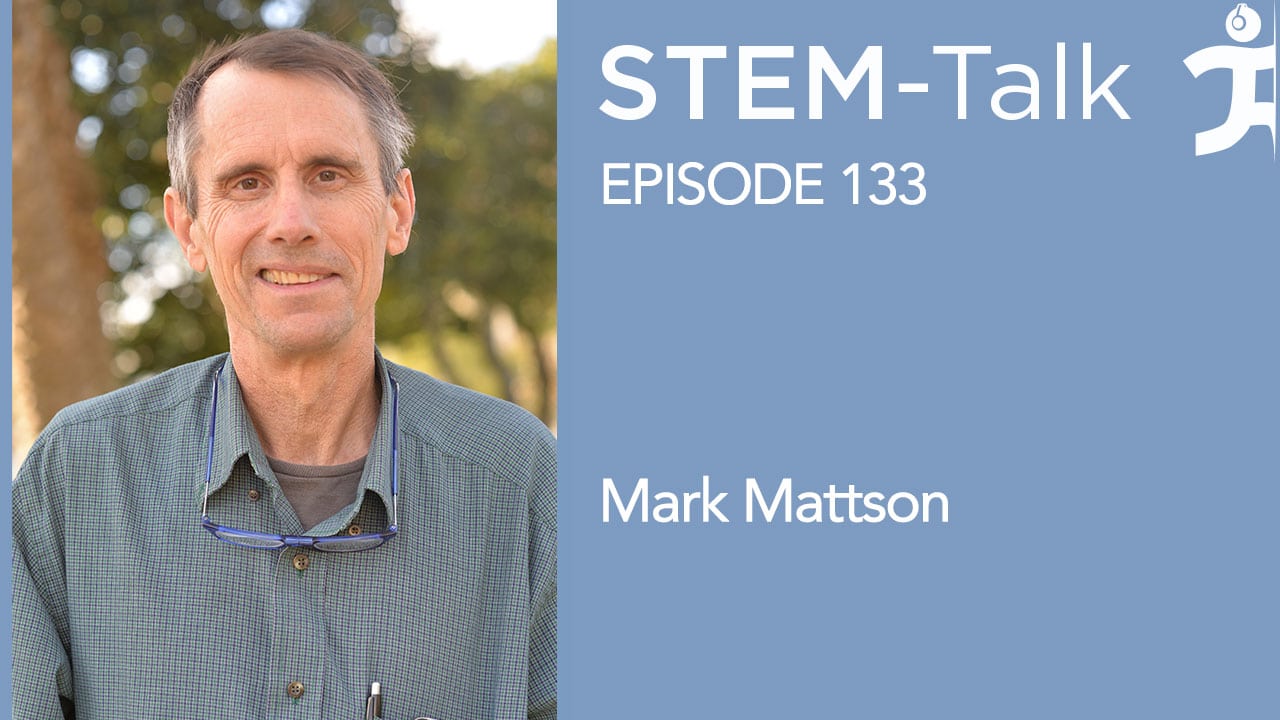STEM-Talk
Episode 133: Mark Mattson talks about the benefits and science of intermittent fasting
// Feb 23, 2022

Our guest today is Dr. Mark Mattson, who is affectionally known as the godfather of intermittent fasting. The National Institute of Health describes Mark as “one of the world’s top experts on the potential cognitive and physical health benefits of intermittent fasting.” He is considered a leader in the area of cellular and molecular mechanisms underlying neuronal plasticity and neurodegenerative disorders and has made major contributions to understanding the pathogenesis of Alzheimer’s disease, Parkinson’s disease, amyotrophic lateral sclerosis and stroke, and to their prevention and treatment.
After spending nearly 30 years researching calorie restriction and intermittent fasting, Mark has written a book on the topic, “The Intermittent Fasting Revolution: The Science of Optimizing Health and Enhancing Performance.” Our interview with Mark came the day after MIT Press released his book.
This is the second time Mark has appeared on STEM-Talk. When we interviewed him back in 2016, intermittent fasting didn’t register on Google’s list of top-10 searches related to diet and eating plans. By 2019, however, intermittent fasting was more widely searched on Google than any other diet. Today, intermittent fasting and the ketogenic diet jockey for Google’s top spot for diet searches.
We talk to Mark in this interview about how, as the title of his book suggests, we are indeed in the midst of an intermittent fasting revolution. In today’s episode, Mark walks us through our evolutionary history and how it has sculpted our brains and bodies to function optimally in a fasted state. We talk about ways our overindulgent sedentary lifestyles have negatively impacted not only our waistlines, but also the size of our brains. After describing the various ways to go about intermittent fasting, Mark dives into the science behind fasting. This leads to a fascinating discussion about the metabolic switch that transitions a person from the utilization of glucose to the utilization of fat-derived ketones and how research is showing that this switch becomes an important factor in the treatment of not only cognitive disorders like Alzheimer’s, but also a range of other diseases and disorders like cancer, diabetes, inflammation, kidney, and heart disease.
Mark is on the neuroscience faculty at Johns Hopkins University School of Medicine. He recently retired from the National Institute of Aging where he led its neuroscience laboratory for the past 20 years.
Show notes:
[00:04:16] Dawn opens the interview congratulating Mark on his new book and asks how long it took him to write it. [00:05:09] Dawn mentions that when Mark was last on STEM-Tall in 2016, intermittent fasting was just beginning to come to the public’s attention, and that today it is almost impossible to pass a grocery store checkout counter without seeing a rack of magazine covers touting intermittent fasting. Dawn asks Mark for his thoughts about what happened in the past decade to suddenly spark so much public interest in fasting. [00:08:20] Ken mentions the title of Mark’s new book, “The Intermittent Fasting Revolution: The Science of Optimizing Health and Enhancing Performance.” Ken asks Mark to expound on the idea that we are witnessing a revolution of interest in intermittent fasting. [00:10:39] Dawn explains that the first chapter of Mark’s book begins with an overview of how evolution sculpted humans and animals to function best in a fasted state. Mark, in this section of his book, makes the point that fasting is not a diet, but an eating pattern that puts a person into a fat-burning state. Dawn asks Mark to briefly walk through this evolutionary history. [00:13:06] Ken mentions that Yuval Noah Harari, author of, “Sapiens: A Grief History of Human Kind,” has said that ancient foragers were the most knowledgeable and skillful people in history. Ken asks Mark to weigh in on Harari’s point that the size of the average brain in Homo Sapiens has actually decreased since the age of hunters and gatherers. [00:17:10] Dawn asks Mark to talk about how our modern overindulgent sedentary lifestyles are having negative impacts on our brains. [00:18:20] Dawn mentions that fasting was relatively popular in the U.S. at the turn of the 20th Century and mentions Josh Turknett, who was recently on STEM-Talk, pointed out that Upton Sinclair actually wrote a book about fasting in 1911. Dawn mentions that Mark in his book also writes about Sinclair as well as Dr. Edward Dewey, who in 1900 wrote “The No-Breakfast Plan and the Fasting Cure.” Dawn asks why society turned its back on fasting when a century ago it was quite popular. [00:19:55] Ken asks Mark to explain how he first became interested in researching intermittent fasting in the 1990s. [00:22:10] Dawn explains that Alzheimer’s disease ultimately affects almost half of the population over the age of 85, and that diseases such as Alzheimer’s and Parkinson’s often start 15 years before serious symptoms are noticed. Dawn asks Mark to explain the hallmarks of brain aging in relation to these diseases. [00:24:55] Ken asks about the evidence for fasting-induced autophagy in humans, and how much fasting is required to activate it. [00:26:22] Dawn asks about the emotional impact of Alzheimer’s and mentions that Mark’s father was diagnosed with the disease. [00:29:57] Mark expounds on his observations that Alzheimer’s and many other diseases of neural degeneration and cognitive decline are largely metabolic diseases. [00:31:45] Ken asks if the loss of muscle mass could have an impact on Alzheimer’s due to the role skeletal muscle plays in glucose storage. [00:33:11] Ken mentions that Mark writes in his book that fasting is characterized by an increase in the concentration of ketones in the blood, and that fasting therefore can be thought of as a ketogenic diet. Ken goes on to mention that in a relatively sedentary person it typically takes about 12 hours to deplete their liver glucose stores and trigger ketones. Ken asks Mark to walk through the chain of events that happen once glucose in the liver is depleted. [00:34:59] Dawn asks Mark to give a brief description of some of the more popular ways of fasting such as time restricted eating, prolonged fasts, fasting mimicking diets, and the 5:2 fast. [00:37:40] Dawn mentions that Gary Taubes came on STEM-Talk last year to talk about his new book “The Case for Keto: Rethinking Weight Control and the Science and Practice of Low-Carb/High-Fat Eating.” Dawn asks if there are differences in terms of the benefits of intermittent fasting and a low-carb ketogenic diet. [00:39:48] Ken asks Mark what distinguishes fasting from caloric restriction, and why does fasting yield benefits beyond what we see in caloric restriction. [00:42:10] Dawn asks about Mark’s work today at Johns Hopkins. [00:44:50] Dawn mentions that one of the key takeaways from Mark’s new book is that metabolic syndrome can often be completely reversed by the adoption of a lifestyle that includes intermittent fasting and exercise. Mark points out that there are studies of animals and humans, however, that show intermittent fasting alone can reverse metabolic syndrome. Dawn asks if Mark believes that a combination of exercise and intermittent fasting is still the best approach. [00:46:33] Ken asks about Mark’s 2019 study that looked at how intermittent fasting improves mood and cognition, which found that hippocampal neuronal networks adapt to intermittent fasting by enhancing GABAergic tone, which is associated with reduced anxiety and improved hippocampus-dependent memory. [00:49:37] Dawn asks about another of Mark’s studies published in 2019 that highlighted what research has revealed so far about the effects and benefits of intermittent fasting. [00:53:06] Dawn asks Mark to briefly discuss why switching the metabolic switch from glucose to ketones seems to have a near system-wide effect, improving outcomes in diabetes, multiple sclerosis, epilepsy, kidney disease as well as stroke. [00:55:13] Ken mentions that intermittent fasting seems to have benefits for a wide swath of our generally overweight and metabolically unhealthy population but wonders if it might be inappropriate in the long-term for vulnerable populations such as the elderly experiencing sarcopenia. [00:59:45] Dawn explains that cardiovascular disease is the leading cause of death in the U.S. and that the fourth leading cause of death is stroke. She goes on to explain that the combination of obesity, insulin resistance, hypertension and aging are the major risk factors for cardiovascular disease and stroke, but there are now studies that show intermittent fasting can reduce stroke and heart disease. Dawn asks Mark which of these findings he thinks shows the most promise. [01:01:22] Ken asks about the new book Mark is currently working on, which has the working title of “Sculptor and Destroyer: The Story of Glutamate, the Brain’s Most Important Neurotransmitter.” [01:04:39] Ken closes the interview asking when the new book is set to go to the publisher.Links:






